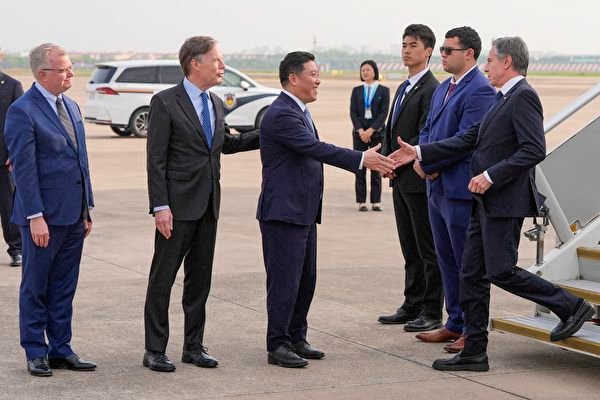Amid ongoing tensions between the United States and China, US Secretary of State Antony Blinken arrived in Shanghai yesterday (24th) and was greeted by Shanghai Foreign Affairs Office Director Kong Fu’an. Kong’s level is only at the department level, and there was no red carpet laid out when Blinken disembarked. Experts believe this is a sign of China’s insecurity, as they anticipate Blinken coming with demands, forcing them to resort to minor gestures to gain some leverage in an attempt to placate domestic nationalists.
According to reports from media under China’s Central Television (CCTV), Blinken arrived in Shanghai on the afternoon of April 24th via a special aircraft. Kong Fu’an and US Ambassador to China Nicholas Burns welcomed him at the airport on behalf of the Chinese and American sides, respectively.
Normally, when a foreign minister visits, they should be welcomed by officials of corresponding ranks, with flowers and a red carpet.
When Blinken visited Beijing in June last year, he was greeted by Yang Tao, the Director General of the Department of North America and Oceania Affairs at the Chinese Ministry of Foreign Affairs, who holds a higher rank than Kong Fu’an. However, there was still no red carpet laid out on that occasion.
In early April this year, when US Treasury Secretary Janet Yellen arrived in Guangzhou, she was greeted by Liao Min, the Vice Minister of Finance from the Chinese side. Though the treatment was relatively better compared to Blinken’s, it still did not match Yellen’s rank.
Independent commentator Cai Shengkun posted on X platform on April 24th, saying, “Blinken’s first stop couldn’t even reach Beijing, the plane could only stop in Shanghai, with no red carpet laid out and no high-ranking officials welcoming him. This is the standard of reception for high-ranking US officials in recent years, purely to disgust American politicians.”
On April 25th, writer and renowned China expert Zhang Jiadun commented on X, saying, “China (CCP) had already insulted Blinken before he even got off the plane.”
Cheng Qinmo, Associate Professor of Diplomacy and International Relations at Tamkang University in Taiwan, told The Epoch Times on April 25th that the Chinese reception for Blinken was naturally unequal, including the absence of a red carpet.
He believes this indicates China’s insecurity, leading them to resort to minor gestures to take advantage and display to domestic audience.
“This time, the CCP also knows the situation well and considers Blinken’s visit to carry significant weight, especially after Blinken specifically exposed evidence of CCP’s assistance to Russia during the NATO and G7 foreign ministers meetings. It is evident that Blinken is here to deliver an ultimatum, hence China can only resort to such minor gestures to gain some leverage, portraying an image of superiority down to the bottom, using this method to placate nationalists or the Chinese people. The CCP often employs such tricks.”
Cheng further mentioned that these minor gestures by the CCP are not surprising nor impressive, showcasing a small-mindedness that lacks the demeanor of a major power.
Upon arriving in Shanghai on the evening of the 24th, Blinken, accompanied by US Ambassador Nicholas Burns, toured Yu Garden, watched a CBA playoff game between Shanghai and Zhejiang men’s basketball teams, and delivered a one-minute video speech via X platform with the Bund as the backdrop. He mentioned his commitment to addressing issues crucial to the American people, one of which is fentanyl.
Earlier this month, the US House Committee on China Issues on X platform raised questions, stating that the Chinese government provides a 13% tax subsidy for certain exported products, especially the precursor of illegal fentanyl, “1-Butyl-3-(1-naphthalenyl)indole.”
Fentanyl is a synthetic opioid drug estimated to cause tens of thousands of American deaths each year.
It is believed that issues such as CCP’s clandestine support for Russian military-industrial development, overcapacity in specific industries, US-China technological competition, as well as topics concerning the South China Sea, Taiwan, and human rights, will also be the focus of contention during Blinken’s visit to China.
Prior to Blinken’s visit, the US took successive actions to counteract negative activities of the CCP.
According to US media reports, preliminary discussions were held to sanction some Chinese banks for their support of Russia; Blinken had also asserted in the State Department’s 2023 “Human Rights Practices Report” that the Uyghur people in Xinjiang are “victims of genocide and crimes against humanity.”
President Joe Biden also signed legislation, including providing military assistance to Taiwan and requiring the ByteDance, the parent company of TikTok, to sell its operations in the US.
Ahead of Blinken’s visit, Chinese state media such as Xinhua News Agency and Global Times issued threatening remarks towards Blinken and the US government.
Moreover, it is unusual for China to disclose its objectives before the visit of heavyweight US figures, but this time it was done anonymously, stating that China aims to achieve five goals, with the primary emphasis on President Biden’s reiterated stance of not seeking a “new Cold War” or seeking to change China’s system, among others.
Cheng Qinmo stated that China’s assertive demands towards Blinken’s visit clearly indicate their underlying intentions, drawing their lines earlier. They reiterate the so-called vision presented during last year’s meeting between the two countries’ leaders in San Francisco, which mostly consisted of China’s unilateral vision without concrete commitments or agreements from Biden.
“I don’t think Blinken will be restricted by this, because the US currently has some significant missions, especially on the battlefield in Ukraine, stability in the Taiwan Strait, averting conflict in the South China Sea, and the adverse effects of fentanyl on American society. These are areas where the US cannot afford to compromise,” he said.

